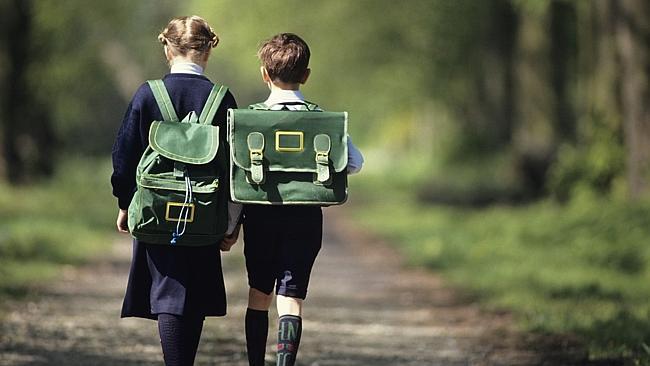You can’t be friends with your kids. Trying to be will lead them down the wrong path
When it comes to underage sexting, kids are the ones at risk. And it’s incompetent, lazy and ignorant parents who are putting them there by not doing their jobs properly.

Rendezview
Don't miss out on the headlines from Rendezview. Followed categories will be added to My News.
Cyber safety pioneers have become the gatekeepers to our children’s souls.
Now they are warning us that sexting is poisoning children as young as 10 with kids sending and receiving naked and semi-nude photos of themselves.
They may not be doing it with the exact intent that we understand but it is still child pornography, according to the law.
The sexting trend, and it had to come to this given an increasing laissez-faire attitude to parenting, has rewound from teens and seeped into the playgrounds of primary schools.
But it’s not what these kids are doing — it is what we as parents are inflicting on them by being soft.
Kids are sexting and pouring acid on their innocence because we have allowed it. So we need to ask ourselves: do we as parents want to sexualise our children and overwhelm them with pornography?
Look in the mirror. Parents are to blame for a corrosive sexting epidemic engulfing our kids. Instead of saying no, we are handing them the mobile weapons to self-destruct.
And worse still, we are not teaching them sufficiently that a naked breast shot at the age of 10 is an image that will haunt them forever.
It is their birthright as children to function as children, rather than deal with intimate physical and psychological triggers that would challenge an adult.
So step up and be the protector not the whiner.
In the UK, they’re calling it a sexting epidemic, with anecdotes to make your blood run cold, like seven-year-olds pretending to be romantically interested in each other to coerce nude images.
Meanwhile, in Australia, school principals are reportedly seeking advice from assault victim groups in a bid to manage young students using their phones as sexual weapons in the virtual world.
The Centre Against Sexual Assault says some children are sending photos of themselves in underwear, which is terrifying enough. Others are more “explicit”.
CASA spokeswoman Carolyn Worth says: “We never would have thought that kids this age would take pictures of themselves nude or in intimate positions. We have to keep playing catch-up.”

Psychologist Dr Michael Carr-Gregg warns that kids are clearly not mature enough to manage their digital footprint. “But it seems to be falling on deaf ears,” he says.
So in the playground, sexts are loitering at lunchtime and it’s causing irreversible damage to young minds.
This is about parents wanting to be their children’s best friend rather than rule enforcer. Parents afraid to use the word “No”. It’s the father sat fuming in the principal’s office because his Year 6 son has pestered a female classmate for a topless shot.
Or the mum bilious with shock, her legs like jelly while she scrolls through her perfect daughter’s phone that’s loaded with begging texts and photos of her girl’s bare bottom or prepubescent vagina.
Police and teachers — the people who are not giving the kids phones — are forced to act because some parents are incompetent and frankly too lazy or ignorant.
Mums and dads need to understand the power of these devices and the basics of speed and reach when it comes to sexualised and personal images.
To use a popular online acronym, many DGAF (Don’t Give a F..k). Parents remain clueless and are more obsessed with not upsetting or “depriving” their kids.
For some parent’s, it seems preferable to have peace and quiet while their dumbstruck kid is engrossed by a device than to have peace of mind that their child isn’t being corrupted with a phone they’ve bought.
But I don’t blame the kids. They are the ones at risk. You have no right to get mad at your children if you can’t be bothered to have a pre-emptive and brutally honest conversation with your child about this.
Increasingly, there is no guidance. Social media expert, Peter Sutton, says the average introduction age to graphic sexual images is 11 years old.
Sutton, who troubleshoots these incidents with schools, insists it is crucial parents do not normalise sexting.
And following your son or daughter on Instagram and Facebook offers no smug protection that you know what they are up to and with whom. Brace yourself for the sinister world of apps, the ones which offer a faux pass code designed to fool mum and dad.
Only the “clean” photos will pop up, Sutton warns. Social media has blurred the lines too much between parent and child and we are now reaping what we have sown. You are not their friend. If you find yourself in the principal’s office, you’re at fault.
And if your kids say they hate you for policing and banning devices, you are doing your job as a parent.
@whatlouthinks



